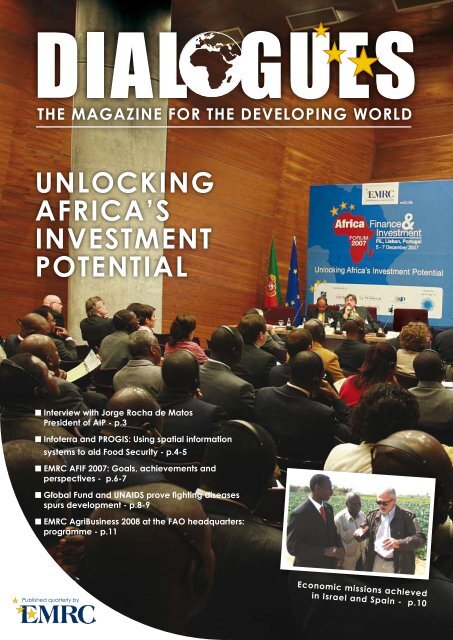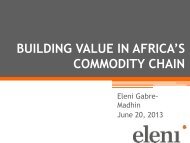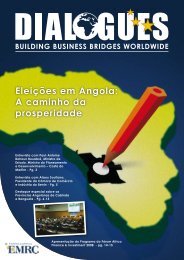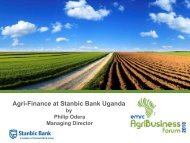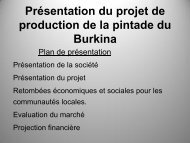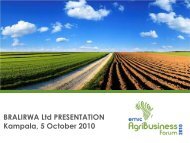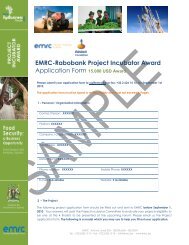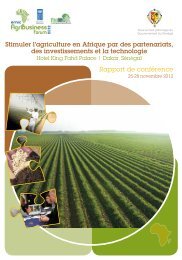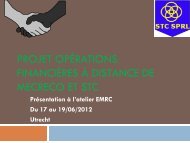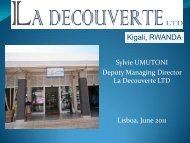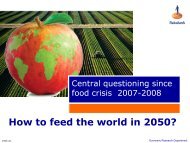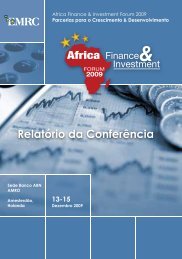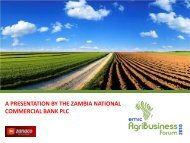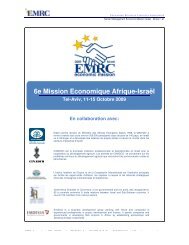English - EMRC
English - EMRC
English - EMRC
Create successful ePaper yourself
Turn your PDF publications into a flip-book with our unique Google optimized e-Paper software.
The magazine for the developing world<br />
UNLOCKING<br />
AFRICA’S<br />
INVESTMENT<br />
POTENTIAL<br />
■ Interview with Jorge Rocha de Matos<br />
President of AIP - p.3<br />
■ Infoterra and PROGIS: Using spatial information<br />
systems to aid Food Security - p.4-5<br />
■ <strong>EMRC</strong> AFIF 2007: Goals, achievements and<br />
perspectives - p.6-7<br />
■ Global Fund and UNAIDS prove fighting diseases<br />
spurs development - p.8-9<br />
■ <strong>EMRC</strong> AgriBusiness 2008 at the FAO headquarters:<br />
programme - p.11<br />
Published quarterly by<br />
Economic missions achieved<br />
in Israel and Spain - p.10
Editorial<br />
The man in the mirror<br />
2008 started on the wrong foot for the African continent –“As always”, pessimists might say… Sadly,<br />
everlasting crisis in Darfur (Sudan), instability in Ituri (East DRCongo), and recent violence in Kenya<br />
still generate a common feeling of insecurity towards the African continent as a whole. “As usual”,<br />
millions of refugees will add their misery to the number of overpopulated urban metropolis; peasants<br />
will abandon their land in search for a brighter future; and children will suffer from curable diseases,<br />
due to the lack of vaccines… These are the sad “clichés” about Africa the world receives frequently<br />
through the eyes of the international media.<br />
Philippe van Maldeghem<br />
Editor-in-Chief<br />
Reality is often distant from the “published” truth, as news come and go, but sometimes leaving<br />
deep prejudice behind. Fortunately, some visionaries are still taking up the challenge, regardless of<br />
the country’s image. The consequence of such bad press can be disastrous for the regions in focus:<br />
foreign investors will be driven out of a region qualified as “unstable”, preventing therefore investments<br />
which are vital for future development. Examples of countries still suffering from the negative<br />
press coming from past conflicts are numerous: Angola, Sierra Leone or Mozambique, to name a few.<br />
Nonetheless, Africa’s countries are vast, and rich in diversity. This perception ought to be taken into<br />
account by foreigners willing to set up businesses in these untamed “Eldorados”. Africa’s development<br />
can only succeed through overcoming stereotypes and establishing private partnerships between<br />
businessmen from Northern and Southern hemispheres. To that extent, members of <strong>EMRC</strong> realize<br />
how much dialogue is a key factor of success, since it enables business agreements and networking.<br />
Parallel to those private initiatives, let’s hope the upcoming French presidency of the EU will tackle<br />
the issues around the new series of economic partnership agreements with ACP countries, which<br />
were due to be in place by the start of the year. A successful Africa should aim at increasing Trade<br />
over Aid. More than ever, the EU has to be ready to give the developing world control over its own<br />
development. This process passes precisely through shared business ideas becoming reality, using the<br />
know-how, contacts and expertise from the developed countries.<br />
To the question: “Who will stand up to give Africa a chance?” The answer starts with the<br />
(business)man in the mirror…<br />
Upcoming projects this year:<br />
■ Economic mission to Israel: 13 to 17 April 2008<br />
■ <strong>EMRC</strong> Agribusiness Forum at FAO headquarters, Rome, Italy: 18 to 20 June 2008<br />
■ Economic mission to Bié, Angola: third quarter of 2008<br />
■ European Development Days, Strasbourg, France: 15 to 17 November 2008<br />
■ Africa Finance and Investment Forum (AFIF): end of 2008<br />
The next issue of Dialogues Magazine will feature a special focus on Zimbabwe<br />
The magazine for the<br />
developing world<br />
Published quarterly<br />
by<br />
Publisher: Idit Miller<br />
Editor-in-Chief:<br />
Philippe van Maldeghem<br />
Main contributors:<br />
Jeanne McCaul,<br />
Hans Gössl, Pierre Coetzer<br />
Designer: Bird<br />
ADVERTISING INQUIRIES<br />
Communication Officer:<br />
Hans Gössl<br />
Tel: +32 (0)2 626 15 17<br />
Fax: +32 (0)2 626 15 16<br />
Email: hg@emrc.be or<br />
dialogues@emrc.be<br />
<strong>EMRC</strong> International<br />
Av. Louise, 283 – bte 22<br />
Brussels 1050, Belgium<br />
Tel: +32 (0)2 626 15 15<br />
Fax: +32 (0)2 626 15 16<br />
Email: info@emrc.be<br />
Website: www.emrc.be<br />
The views expressed in this issue of Dialogues are the private views of individuals and are not necessarily those of <strong>EMRC</strong> International, its executive committee, or members of its business<br />
network. Reproduction in whole or in part is permitted, providing that any such reproductions, whether in whole or in part, are not sold, unless they are incorporated in other works.<br />
- DIALOGUES - <strong>EMRC</strong>
I nterview<br />
Jorge Rocha de Matos<br />
President of AIP<br />
(Portuguese Industrial Association)<br />
Lisbon, December 2007<br />
■ Dialogues: : In your opinion, what were<br />
the main results of the EU-Africa Business<br />
Summit?<br />
Rocha de Matos: : The EU-Africa Business<br />
Summit was an important moment for the settlement<br />
of a new dynamism in the relations<br />
with Africa. This dynamism considers the regional<br />
agreements of economic partnerships<br />
as well as the promotion of an effective integration<br />
of African countries in the<br />
global and regional economy.<br />
The EU-Africa Business Summit<br />
represented an opportunity for<br />
the African and European business<br />
leaders to develop approaching<br />
mechanisms and to debate on<br />
“thematic round table” subjects<br />
such as commerce, investment and<br />
development of resources and infrastructures.<br />
The event was also<br />
important for the reinforcement of<br />
reliable relations at political, institutional<br />
and business level.<br />
■ Dialogues: Throughout the last<br />
decade <strong>EMRC</strong> has organised numerous<br />
international initiatives to expand<br />
business linkages between Europe and Africa.<br />
How do you see these initiatives?<br />
RdM: AIP–CE considers it very important<br />
to promote this type of initiative by organisations<br />
that represent the civil society and<br />
particularly the business sector. These organisations<br />
play a fundamental role in the promotion<br />
of relations between the two continents.<br />
It is at the level of decentralized cooperation<br />
between companies that it is possible to establish<br />
durable relations and to share common<br />
interests.<br />
■ Dialogues: What actions can be taken in<br />
order to strengthen the relations between<br />
Africa and Europe?<br />
RdM: At a political level, the European Union<br />
has developed a strong cooperation process<br />
with the private sector through working<br />
José Amaro Tati, Governor of the Angolan Province of Bié, discussing business<br />
opportunities with Portuguese entrepreneurs at the AFIF Forum.<br />
meetings and action instruments that have<br />
taken place throughout almost one decade:<br />
to start, the first historical EU-Africa Summit<br />
in 2000 in Cairo under the Portuguese Presidency<br />
that gave origin to the Declaration and<br />
the Cairo Plan of Action; then the launching<br />
in 2001, of the New Partnership for Africa’s<br />
Development (NEPAD); in 2002, the creation<br />
of the African Union (AU) and; in 2005, the<br />
European Commission adopted its communication<br />
on “Strategy of the EU for Africa”,<br />
which was approved by the European Parliament<br />
and Council. It’s consensual that it is<br />
really important to deepen this framework<br />
of cooperation and common action. Europe<br />
can have a very important role in the field of<br />
education, training, R&D and countries like<br />
Portugal with long and strong relations with<br />
Africa can and should be important partners<br />
of this Continent, in order to minimize the<br />
constraints to its development. I believe that<br />
the European Union will benefit politically,<br />
economically and strategically if it gives<br />
more attention to Africa and if it knows how<br />
to find the right instruments for cooperation.<br />
I am sure that the business community of both<br />
continents is an active and very interested<br />
part of this partnership for the development<br />
and the competitive affirmation of Africa in<br />
the global economy.<br />
Jorge Rocha de Matos and Idit Miller<br />
■ Dialogues: As President of the AIP, do<br />
you see the promotion of relations between<br />
the Members of your Association with Africa<br />
– mainly the PALOPs (African Portuguese<br />
Speaking Countries) as a priority?<br />
RdM: We have strong relations with Africa,<br />
and in first place with PALOPs.<br />
The conferences, the training<br />
courses at the public and private<br />
level, the business missions in different<br />
sectors and the approach to<br />
associative structures similar to<br />
ours are some of the many initiatives<br />
that AIP-CE has developed<br />
with the African continent. Although<br />
PALOPs are the main partners<br />
of the AIP-CE in Sub-Saharan<br />
Africa, our collaboration is not<br />
restricted to these countries.<br />
For example, we have the case of<br />
South Africa, where we have one<br />
of the biggest Portuguese emigrant<br />
communities, and which is also<br />
one of our priorities. We also develop initiatives<br />
with other North Africa countries. ■<br />
About AIP-CE<br />
Counting more than 75.000 direct and indirect<br />
associated members, Portuguese Industrial Association/Entrepreneurial<br />
Confederation has<br />
consistently worked towards the improvement of<br />
the Portuguese economy’s competitiveness, with<br />
special focus on organisational and technological<br />
modernisation of its SMEs. Aiming to represent<br />
and defend the Portuguese entrepreneurs’<br />
interests, AIP-CE is known for its unique position<br />
in the associative movement in Portugal. It<br />
is active in providing a wide range of services<br />
for its members, for instance by organising international<br />
trade fairs and conferences or promoting<br />
international expansion.<br />
Quarterly - Spring 2008 -
Mapping Africa to unlock wealth<br />
Infoterra is a leading provider of geo-information products and services, which have become<br />
vital for managing the world’s environment, development and security. The Infoterra Group has<br />
approximately 300 employees in the UK, France, Germany and Hungary and an extensive network<br />
of partners covering all five continents.<br />
”<br />
What we are looking to achieve<br />
using geospatial mapping, is<br />
to unlock Africa’s wealth”,<br />
says Simon Ashby, Principal<br />
Consultant with Infoterra. He goes on to explain<br />
that security of land ownership is key<br />
to development, while reliable mapping is a<br />
prerequisite to land and property registration<br />
and ownership.<br />
The total landmass of Africa is 30.3 million<br />
square kilometers while, by contrast,<br />
Argentina, India, China, Western Europe<br />
and the USA, together make up 28.8 million<br />
square kilometers. Meanwhile, the<br />
maps of Africa are completely out of<br />
date, going back to Colonial times. For<br />
instance, the massive urbanisation, which<br />
has taken place in recent decades, has remained<br />
essentially unrecorded.<br />
Geospatial mapping, a digital technology,<br />
which provides detailed and reliable spatial<br />
data, is the 21st century’s answer to<br />
those old fashioned, hand drawn maps to<br />
be found in antique shops.<br />
Raw data, such as accurate land statistics and<br />
infrastructure, is transformed into business<br />
information for the benefit of both the public<br />
and private sectors. The examples of areas of<br />
application of this technology are impressive:<br />
improved land, water and forest management,<br />
biodiversity and conservation,<br />
determining crop prospects and desertification<br />
risks, alerts on natural disasters,<br />
communication network planning<br />
(roads, railways, electricity, telecom…),<br />
establishing accurate topology such as<br />
building heights, etc.<br />
The technology of geospatial mapping<br />
is already being considered and implemented<br />
in a number of developing<br />
countries in Eastern Europe, such as Bulgaria,<br />
Romania, the Balkans, Macedonia and Kosovo<br />
– in particular to settle land ownership issues<br />
exacerbated by the fact that many records<br />
of ownership were lost or destroyed during recent<br />
conflicts.<br />
Today national spatial frameworks can be<br />
created and constantly modified to reflect<br />
changed circumstances on the ground, such as<br />
urbanisation. Britain has had a national mapping<br />
agency since 1791 and, following a comprehensive<br />
digitisation programme, resulting<br />
in the release of Ordinance Survey’s MasterMap®<br />
in 2001, now has one of the most<br />
sophisticated national geographic frameworks<br />
in the developed world.<br />
Infoterra’s online spatial application supporting a<br />
Land Administration business process<br />
The MasterMap® references over 440 million<br />
natural and manmade landscape features<br />
to which 5,000 changes are made daily. This<br />
is an example of what is technically possible,<br />
provided the political will is there and the finances<br />
allocated.<br />
The technology of<br />
geospatial mapping is<br />
already being considered and<br />
implemented in a number<br />
of developing countries in<br />
Eastern Europe<br />
“The challenge we face is implementation”,<br />
says Ashby. In 2006 the Africa Land Policy<br />
workshop in Kampala recognised that implementation<br />
was far from straight forward.<br />
A policy document has been drawn up, but it<br />
must be translated into a comprehensive programme<br />
of land sector reform. “Governments<br />
need to give the concessions to implement the<br />
available technology and investment banks<br />
should provide the funding”, says Ashby.<br />
Population drift to the cities increases informal<br />
land tenure systems, which in turn, increase<br />
slums. Approximately 70% of African<br />
land is managed informally, with profound<br />
consequences on sanitation, water and access.<br />
Such un-formalised rural, peri-urban and urban<br />
tenures affect the poorest people.<br />
Since they do not formally own the<br />
land, they have no rights on it nor incentives<br />
to develop it.<br />
Currently countries that have recognised<br />
the importance of land administration<br />
are trying to develop individual<br />
approaches, but this is not cost<br />
effective. Therefore, the Land Administration<br />
Retreat hosted in November<br />
2007 by the World Bank in Washington<br />
and attended by several UN agencies,<br />
recommended the establishment<br />
of universal principles and standards.<br />
It was also recommended that the importance<br />
of technology for good governance<br />
should be recognised and that<br />
countries should be identified for case studies.<br />
Subsequently, the Land Registrars Expert<br />
Group Meeting in Nairobi, highlighted the<br />
value of communicating with Land Registrars.<br />
These a-political civil servants are responsible<br />
for registering land tenure.<br />
“Typically, registration of property will<br />
take 400 days in, for instance, Nigeria.<br />
Reducing this procedure to a tenth of<br />
this, for instance by establishing a state<br />
data-base to support registrations, would<br />
be an enormous incentive for development.<br />
Once people have secure ownership<br />
of their land, they will then feel<br />
safe to perhaps purchase their neighbor’s<br />
land, allowing the neighbor to pursue<br />
another profession or trade, to which they are<br />
perhaps better suited” says Ashby. “Needless<br />
to say, such a data-base would also be of great<br />
help in land feuds and in preventing corruption.<br />
The African Union is very interested in<br />
the potential of geospatial systems and, fortunately,<br />
some African countries are moving in<br />
the right direction”. ■<br />
- DIALOGUES - <strong>EMRC</strong>
Upstream or downstream,<br />
we all drink from the same<br />
source…<br />
Walter Mayer, CEO of Progis<br />
Walter Mayer, CEO of PROGIS GmbH,<br />
a respected GIS-software supplier and<br />
consulting company, is emphatic: “There is<br />
no reason at all for farmers, consumers and<br />
environmentalists to be enemies. After all, we<br />
all have the same concerns. When the river is<br />
polluted upstream, everyone downstream suffers.<br />
The future has to be not either food or<br />
water and environment, but both, for all of us.<br />
It follows that it is in everybody’s interest to<br />
respect our valuable resources - such as water<br />
- and invest in managing them well. And by<br />
the way, this challenge is the same in developed<br />
as well as developing countries!”<br />
PROGIS has been focusing for several years<br />
on the development of the appropriate technical<br />
applications for efficient management<br />
of agriculture, forestry, ecology and general<br />
land-use. The company advocates an integrated,<br />
holistic approach, encompassing the<br />
needs of farmers and affiliated industries and<br />
authorities. Many large industries and organisations<br />
are already benefitting from this expertise<br />
and can serve as examples and references.<br />
Mayer goes on to explain that the basic<br />
management model is similar for individual<br />
farmers, groups of farmers, or large co-operatives.<br />
The challenge is to use the model integrating<br />
agriculture, and/or forestry as well as<br />
environmental tasks. (In this context the FAO<br />
actually poses the question in its recent annual<br />
publication: should farmers be paid to protect<br />
the environment?) There is also a real need<br />
for politicians everywhere to understand how<br />
technology can be of help.<br />
The World Bank has been asking how information<br />
technology can contribute to the<br />
well-being of communities. “We have the answers,”<br />
says Mayer. “Environment problems<br />
can be solved by information technology. For<br />
example, instead of guessing as farmers did<br />
in the past, technology allows us to make accurate<br />
calculations as well as evaluations. We<br />
can calculate the optimum use of fertiliser and<br />
we can evaluate the quality of the water (levels<br />
of nitrogen) and monitor the processes on<br />
an everyday basis.”<br />
The topic of “rural area management” is inseparably<br />
connected with the sustainability<br />
of a healthy environment. The cultivation of<br />
fields, pastures or forests has direct effect, not<br />
only on food, feed and bio-energy, but also on<br />
the earth’s atmosphere, land, water, and biological<br />
resources.<br />
To meet all these challenges, multi-class collaborations,<br />
supported by an increased use of<br />
advanced ICT-technologies and tools, are essential.<br />
“Together with ‘SaRAM’, a specific<br />
education and training programme, we recently<br />
launched a product range, called ‘AGROffice<br />
complete’. With ‘one-stop-shop’ all the<br />
needs on rural area ICT can be met”, says<br />
Mayer. SaRAM itself informs on situations,<br />
expectations, chances and risks in rural areas,<br />
trains software users and helps stakeholders to<br />
get ready for this rapid and dynamic market<br />
development. It assists participants and supports<br />
them by implementing agro-projects in<br />
countries or regions.<br />
PROGIS works in close collaboration with<br />
Infoterra (see previous page) ■<br />
Netafim: household name for<br />
irrigation technologies<br />
Netafim describes itself as a “growing solutions”<br />
company and is the world’s largest<br />
low volume irrigation company. In fact, Netafim<br />
has become a household name in the business<br />
of irrigation. The company has 45 years of experience<br />
in 110 countries on 5 continents via 35<br />
subsidiaries, as well as additional, independent,<br />
Netafim trained representatives worldwide.<br />
Manufacturing facilities have also been established<br />
in 11 countries and there are over 2200<br />
employees.<br />
“Today everybody is concerned with issues<br />
regarding the environment. But the subject is<br />
far from new; it is just that awareness has increased<br />
on every level of society, also with the<br />
general public. However, we have been dealing<br />
with the subject of environment for over 4<br />
decades, always with the aim to increase crop<br />
yield, while preserving water resources and the<br />
environment. Over the years we have developed<br />
tailor-made solutions for many different<br />
needs and conditions. These include irrigation<br />
technologies and crop management (open field<br />
crops, orchards and greenhouses), desalination<br />
and purification, industrial waste water treatment,<br />
solutions for bio-fuel energy, etc.” says<br />
Natan Barak, Netafim’s Commercial Director<br />
for Europe, Middle East and Africa.<br />
The company’s clients include governments,<br />
communities and private entrepreneurs. But<br />
Barak describes the company’s approach and<br />
philosophy as fundamentally “farmer to farmer”.<br />
Indeed: the company originated in an Israeli<br />
Kibbutz (co-operative farm) and at the present<br />
time 3 Kibbutzim own the majority shares of<br />
the company with 50% of the owners still active<br />
members of these Kibbutzim.<br />
Netafim is well-known for its flexibility and<br />
creativity in finding solutions to sometimes very<br />
difficult local circumstances, for instance in developing<br />
countries faced with limited financial<br />
resources.<br />
“We take into account the existing strengths and<br />
energies in each situation and can ensure good<br />
returns and profits on average within 3 years,<br />
even with minimum financial investment. The<br />
problems facing the world today concern us all.<br />
Population growth is a global reality. Inevitably,<br />
we will have to increase food production<br />
and yields and, more and more, we will need to<br />
achieve this using less and less water, because<br />
water resources are not only limited, they are<br />
shrinking, “ says Barak. ■<br />
Barak: “Netafim’s solution for family-sized farming: an excellent application that enables<br />
families to produce their own food with minimal resources.”<br />
Quarterly - Spring 2008 -
Africa Finance &<br />
Investment Forum 2007:<br />
Success stories in Africa’s<br />
private sector development<br />
Africa<br />
FORUM<br />
2007<br />
Finance& Investment<br />
How to unlock Africa’s investment potential? Representatives<br />
from four continents and 25 countries gathered at the <strong>EMRC</strong><br />
Africa Finance & Investment Forum 2007 on 5-7 December in<br />
Lisbon to discuss and showcase the investment potential of<br />
Africa’s diverse private sectors.<br />
18-99-99-9 14-50-100-0 9-19-94-0<br />
The <strong>EMRC</strong> Forum was organised<br />
within the bigger framework of the<br />
first EU-Africa Summit in seven<br />
years, which took place at the same location<br />
one day after the private sector event. Held<br />
under the high patronage of the Portuguese<br />
Presidency of the Council of the European<br />
Union, the event thus complemented the<br />
discussions of the political Summit with its<br />
specific focus on Africa’s private sector development.<br />
Showcasing practical<br />
business solutions<br />
Idit Miller, Managing Director at <strong>EMRC</strong> International,<br />
defined the added value of<br />
Kingsley Moghalu, Head of Global Partnerships<br />
at The Global Fund: “The three pandemics - HIV/<br />
AIDS, tuberculosis and malaria (...) are described<br />
as diseases of poverty because, compared to<br />
wealthy parts of the world, their impact in developing<br />
countries is devastating.”<br />
the <strong>EMRC</strong> Forum in its emphasis on practical<br />
business solutions and direct exchange<br />
possibilities with major decision makers.<br />
According to her, “this Forum gives a unique<br />
exchange opportunity for private investors<br />
across Africa and Europe to drive the economy<br />
in Africa.”<br />
In its three-day programme the Africa Finance<br />
& Investment Forum presented a wide<br />
range of successful business initiatives in<br />
Africa’s private sector. High-rank speakers<br />
showcased funding opportunities as well as<br />
first-hand analysis of Africa’s financial markets<br />
and enabling environment for sustainable<br />
investment. Special sessions on Public-Private-Partnership<br />
programmes on agriculture<br />
and rural development, health and spatial<br />
data infrastructure completed the exchange of<br />
success stories and best practices. Throughout<br />
these intensive discussions, participants<br />
were given additional possibilities to meet<br />
in targeted one-to-one business meetings<br />
and explore concrete business projects and<br />
partnerships.<br />
A concluding key moment took place at the<br />
event’s Gala Evening with the announcement<br />
of the <strong>EMRC</strong> Awards. These prestigious<br />
Awards honoured selected achievers,<br />
heads of commercial and national financial<br />
institutions in Africa for their leadership<br />
and achievements in Africa’s economic<br />
development.<br />
The joint organisation with the EU-Africa<br />
Business Summit on the <strong>EMRC</strong> Forum’s<br />
last day gave participants additional contact<br />
opportunities with key-note speakers,<br />
such as José Sócrates, President of the<br />
Council of the European Union and José<br />
Barroso, President of the European Commission<br />
as well as with government officials,<br />
business leaders and development experts<br />
like Ngozi Okonjo-Iweala, Managing Director<br />
of the World Bank and Louis Michel, EU<br />
Commissioner for Development.<br />
Gideon Gono, Governor of The Reserve Bank of<br />
Zimbabwe and Philippe van Maldeghem<br />
Identifying Investors and<br />
project owners<br />
Ibrahim Mallam Aliyu, Chairman of Urban<br />
Shelter Limited, one of the representatives of<br />
the Nigerian private sector said his attendance<br />
at the <strong>EMRC</strong> Forum has been rewarding.<br />
“I have unlocked my potentials and those of<br />
Nigeria at the event. My presence has led to<br />
an acquaintance of investors willing to come<br />
to Nigeria – open a shopping mall and a hotel.<br />
The investment summit is a gathering of<br />
potential investors and those who need the<br />
resources.”<br />
“It is our aim to gather the best heads in this<br />
platform” explained Idit Miller, “and we do<br />
not leave it with this. Following our <strong>EMRC</strong><br />
Forums we organise targeted Economic Missions,<br />
tailored events and advise participants<br />
with our business development services to<br />
follow-up the valuable contacts and expertise<br />
gained from the event.”<br />
Africa is not only about business potential, but<br />
also about business success. <strong>EMRC</strong>’s Africa<br />
Finance & Investment Forum has shown concrete<br />
examples of the continent’s private sector<br />
contribution to sustainable development. ■<br />
- DIALOGUES - <strong>EMRC</strong>
A programme of the ACP group and the<br />
European Commission for the promotion<br />
of investment<br />
Starting in July this year, the upcoming<br />
French presidency of the European Union<br />
should tackle the issue of EU-ACP economic<br />
partnership agreements. In line with it,<br />
Pro€Invest is a programme undertaken by the<br />
European Commission to promote and facilitate<br />
the inward flow of investment, technology,<br />
know-how and management skills to the<br />
ACP States. It is financed under the 8th European<br />
Development Fund and managed by<br />
an autonomous unit within the Centre for the<br />
Development of Enterprise (CDE) under the<br />
supervision of EUROPEAID, the Cooperation<br />
Office of the European Commission. The<br />
strategy of the Centre for the Development of<br />
Enterprise is based on three principles, “sector<br />
+network+partnership”, where wider sectorial<br />
projects will be implemented through a complete<br />
range of services offered to small and<br />
medium enterprises.<br />
Microfinance: Bright<br />
prospects in Cameroon<br />
The ACP Group of States and the European<br />
Commission are in the process of signing the<br />
prolongation of the programme until the end<br />
of March 2011. While the underlying objectives<br />
of the Pro€Invest programme remain<br />
valid, the emphasis of the programme will be<br />
increasingly put on institutional strengthening<br />
among ACP Intermediary Organisations (IOs).<br />
The final scope is the public-private dialogue<br />
between IOs and governments. Therefore, direct<br />
assistance to small and medium enterprises<br />
will decrease: these are expected to benefit<br />
indirectly from the strengthened capacity of<br />
IOs. The programme will also include interventions<br />
with Regional Organisations and<br />
support of IOs through the Pro€Invest Information<br />
Community (PIC).<br />
The PIC will aim to ensure co-ordination,<br />
cross-fertilisation and the avoidance of duplication<br />
of effort between all EC-funded programmes.<br />
It may refer applicants to other programmes<br />
for interventions which are sound<br />
but otherwise ineligible for funding under<br />
Pro€invest. The programme consists of unblocking<br />
€110 million over 7 years. ■<br />
“Microfinance is emerging as a major driving force of the<br />
economy in Cameroon”, says Mr Michel Nyami, the Deputy<br />
Director General of Crédit Communautaire d’Afrique, or CCA<br />
Microfinance.<br />
CCA is a leading provider of microfinance<br />
in the CEMAC monetary area, and is involved<br />
in numerous economic development<br />
projects. “We focus on people with no access<br />
to the formal banking system, providing them<br />
with the capacity to raise finance for microprojects”.<br />
Indeed, over 70 % of CCA’s client<br />
base falls in this category. In 2007, CCA<br />
attracted savings of 27 million euros, and<br />
financed projects to the tune of 15 million<br />
euros, mostly out of current account deposits.<br />
“We offer individuals an original way of<br />
building up savings based on a system of joint<br />
surety given by for periods of between three to<br />
six months. In this way loans can be raised by<br />
people who would not have been able to do so<br />
individually”. This approach is proving very<br />
popular: So far, over 31,000 loans have been<br />
granted by CCA, a threefold increase since<br />
2005. And Nyami is keen to emphasise CCA’s<br />
commitment to its customers: “We are looking<br />
to create a bond of trust with marginalised<br />
parts of the population. For instance, we<br />
helped setting up a cooperative of 300 small<br />
farmers in the field of medicinal plants under<br />
the wing of AFRIMED”. Furthermore, the<br />
authorities in Cameroon have clearly realised<br />
the importance of microcredit institutions.<br />
Michel Nyami receiving the <strong>EMRC</strong> Award, on<br />
behalf of Albert Nkemla from CCA, Cameroon.<br />
CCA’s aim is to find reliable partners prepared<br />
to offer long term credit facilities. This would<br />
allow it to respond to the rising demand for<br />
the financing of medium to long term projects.<br />
“We are faced with two types of challenges:<br />
First, we handle almost exclusively current<br />
account cash deposits, which are not suited<br />
to any time-related commitments. Secondly,<br />
local microfinance institutions fundamentally<br />
lack refinancing and compensation mechanisms”.<br />
The successful establishments of partnerships<br />
will be important to secure CCA’s projects for<br />
the coming five years. ■<br />
<strong>EMRC</strong> Awards 2007<br />
A key moment of the event was the Gala Evening, where individuals were honoured for their leadership<br />
and achievements in Africa’s economic development. This year’s <strong>EMRC</strong> Awardees were: Albert<br />
Nkemla of Crédit Communautaire d’Afrique, Cameroon, Martin Djedjes of BIAO (Banque Internationale<br />
pour l’Afrique Occidentale), Ivory Coast, Dablé Grah, Roche Internationale, Ivory Coast,<br />
Théophile Gogui Zegre, SOGEPIE, Ivory Coast, Gideon Gono, Governor of The Reserve Bank of<br />
Zimbabwe and Adriano Pascoal, President of the Banco de Comércio e Indústria de Angola.<br />
Babs Adenaike, Programme Manager at Pro€Invest (right),<br />
presenting the Award to Martin Djedjes of BIAO, Ivory Coast (left)<br />
Quarterly - Spring 2008 -
I nterview<br />
Michel Lavollay<br />
Senior consultant for UNAIDS<br />
Brussels January 2008<br />
Michel Lavollay was practicing medicine in<br />
Paris when AIDS was discovered. He got involved<br />
with this disease in the 1980’s, and cooperated<br />
with French and international institutions<br />
to find responses to deal with the issue.<br />
This led him as far as the WHO in Geneva, the<br />
UNDP as well as at the UN Secretariat in New<br />
York, private foundations, and at the French<br />
Embassy in Washington. He then spent four<br />
years in the early creation of the Global Fund<br />
to fight AIDS, TB and Malaria, where he<br />
pushed for the establishment of a public/private<br />
strategy and funding mechanisms.<br />
Considering this heavy experience, he works<br />
now in Brussels as senior consultant for a variety<br />
of organisations and, more recently, UN-<br />
AIDS, where he aims at reinforcing the discussions<br />
on health, HIV, diseases linked to poverty<br />
and partnerships with the private sector.<br />
■ Dialogues: How would you define<br />
UNAIDS’ priorities regarding the poverty<br />
situation in developing countries, since<br />
health problems are often linked to poverty<br />
and impede development?<br />
ML: UNAIDS’ experience is critical, because<br />
a lot of what is being discussed for the moment<br />
on health, partnerships, or mechanisms for delivery<br />
of services in the poorest countries, is<br />
very much related to what was achieved in<br />
responding to HIV. The participation of<br />
UNAIDS as well as other institutions -<br />
like the WHO or the Global Fund, the<br />
World Bank, and the UNDP, is essential<br />
to maintain a discussion on these health<br />
topics and the broader discussions on<br />
development objectives. UNAIDS’ role<br />
is also important in creating partnerships<br />
with the European institutions, governments,<br />
and the civil society. We aim to help the<br />
dialogue between civil society organisations<br />
and local institutions. Actually, just talking<br />
about the problems is not enough! Solutions<br />
and practical mechanisms to bring additional<br />
resources and capacities, in order to improve<br />
the efficiency of delivery of development aid<br />
must be found, and that is a real challenge.<br />
DG DEV (Directorate for Development of the<br />
European Commission) has an important and<br />
clear role in strengthening partnerships.<br />
■ Dialogues: Big organisations created by<br />
the UN or the EU suffer criticism because of<br />
their complexity and delay before action is<br />
implemented. In your opinion, what could be<br />
done for these organisations to acquire a better<br />
knowledge on the matter and to improve<br />
the public/private partnerships?<br />
ML: There is an interesting parallel to draw<br />
between the transitions at the UN in the past<br />
twenty years, and what can happen with the<br />
EU, in the sense that the EU must go through<br />
transitions and transformations that take time<br />
in order to integrate fully civil society in its<br />
work. This is not about theory but reality and<br />
how partnerships can actually exist. The reality<br />
is that private corporations are developing<br />
programmes and partnerships on the ground<br />
with local authorities, NGOs, and are actually<br />
transforming the reality in these particular<br />
regions through these partnerships. It is this<br />
sort of action that needs to be valued and promoted.<br />
T he various institutions, the interested<br />
stakeholders and groups like <strong>EMRC</strong>, who<br />
have a critical role to play in bringing the people<br />
together like you did it in Lisbon, have to<br />
be supported in establishing a dialogue and to<br />
gradually bring the stakeholders to a common<br />
understanding that there is value and a benefit<br />
in these discussions, not just for the institutions,<br />
but also for the private sector. What is<br />
The problem is not the<br />
lack of resources, because<br />
governments are receiving large<br />
amounts of money. It is more a<br />
question of dialogue<br />
and understanding.<br />
striking in Brussels is that everyone, politically<br />
and in various parts of the EU process,<br />
is convinced that nothing can be done without<br />
public/private partnerships. This takes time<br />
and requires a confidence-building process.<br />
The potential partners must feel confident<br />
that what they bring to the various partnerships<br />
will not be modified or be deviated from<br />
their original purpose because companies get<br />
involved to do business! We have to stay away<br />
from substitution and philanthropy!<br />
I have participated with other institutions and<br />
bilateral entities in developing an approach<br />
that we call co-investment, a simple mechanism<br />
in which partners negotiate the terms of<br />
their partnerships in order for them to achieve<br />
common goals. These co-investments in areas<br />
such as HIV or malaria are being implemented<br />
in Africa. There are even projects now that<br />
benefit not only the partnerships, but also the<br />
eco-systems. For example, in some coastal areas<br />
in East-Africa, the regression of malaria<br />
allowed to promote tourism and other secondary<br />
benefits that are far beyond public health<br />
and have a direct impact on the local economies.<br />
Potentially, this is a constructive way to<br />
look at development.<br />
■ Dialogues: A healthy environment creates<br />
and promotes development. In your opinion,<br />
what could be done to help governments focus<br />
on social issues, allowing therefore private<br />
companies to focus on business issues?<br />
ML: Today it is basically a question of necessity.<br />
If you analyse what public, private and<br />
local NGOs can achieve at a local level, the<br />
political variable is out of the equation. There<br />
is a lot less evaporation of funds nowadays and<br />
we can clearly see what these organisations<br />
can do together. The problem is not the lack<br />
of resources, because governments are receiving<br />
large amounts of money. It is more a<br />
question of dialogue, and understanding.<br />
Discussions are needed, because business<br />
objectives can be compatible with<br />
social objectives. Furthermore, there is a<br />
need to define and promote the kinds of<br />
mechanisms by which the objectives are<br />
not lost. The business community needs<br />
to be confident that its contributions<br />
are respected, that the lines of responsibility<br />
are well identified and that the monitoring is<br />
shared in order to reach common objectives.<br />
The analysis of what actually happens in practice<br />
shows us that common objectives can be<br />
found, that there are methodologies defined<br />
between the parties involved. But at the institutional<br />
level, there is always a tendency<br />
to interpret and mistrust. So the discussions<br />
should be focused on what is happening in<br />
concrete terms. All these elements from real<br />
- DIALOGUES - <strong>EMRC</strong>
“Health is Wealth”<br />
The Global Fund to fight AIDS, Tuberculosis<br />
and Malaria is headquartered in<br />
Geneva, Switzerland. It was set up in 2002<br />
at the initiative of the then Secretary General<br />
of the United Nations, Kofi Annan, to<br />
mobilise, manage and disburse large sums<br />
of money, initially to combat the spread of<br />
HIV/AIDS in developing countries. Mr Annan<br />
put his money where his mouth was by<br />
time situations can be included in models that<br />
will be used to create partnerships and share<br />
experiences.<br />
■ Dialogues: Considering that a company’s<br />
experience can stimulate other companies<br />
to follow its footsteps, could you give us an<br />
example that proves that the system works,<br />
where partnerships are actually taking<br />
place?<br />
ML : The Malawi project, is a very important<br />
project that was introduced four to five<br />
years ago, that I helped negotiate, where<br />
the Ministry of Health received one of the<br />
first rounds of grants from the Global Fund<br />
($ 200 Million) on HIV treatment. The proposal<br />
was considered a very sound one but,<br />
not unexpectedly, within a year the government<br />
started to have some problems executing<br />
and implementing. The process at the Global<br />
Fund is results-based and if a recipient can’t<br />
deliver, then, either solutions are found, either<br />
the grant is lost. For the Malawi situation, we<br />
argued that there was a structured coalition of<br />
businesses involved in HIV. It included more<br />
than thirty companies, working together on<br />
the disease with clinics and trained personnel.<br />
After two years, the coalition negotiated the<br />
terms of delivery of a large part of the grant,<br />
which enabled the government to actually<br />
keep the grant. This shows that you can create<br />
large scale partnerships using the capacity,<br />
additional financial and technical resources.<br />
This example has become a very interesting<br />
and useful model for future projects.<br />
There are also very interesting initiatives regarding<br />
Malaria, like MOZAL, in South-Africa<br />
and Mozambique, developed for three<br />
years now. Joint programmes between local<br />
governments, the Global Fund and NGOs<br />
have been implemented to distribute medicine<br />
and treatments for malaria, which has brought<br />
very significant and rapid results, on the workforce,<br />
as well as on their families and the local<br />
communities. Also, the eco-system has benefited<br />
from these joint programmes and as a<br />
result, tourism has grown. ■<br />
making a personal donation of USD100,000<br />
to what he called the “war chest”.<br />
Today, five years later, the Fund’s assets total<br />
USD 21 billion, of which 10 billion have<br />
been committed to health programmes already<br />
approved by the fund in 136 countries on 5<br />
continents. Moreover: today the Fund’s programmes<br />
target not only HIV/ AIDS, but also<br />
the two other major poverty-related pandemics:<br />
malaria and tuberculosis. At the present<br />
time, the Fund’s money accounts for 65% of<br />
available international resources in the fight<br />
against tuberculosis, 65% for malaria and 25%<br />
for HIV/AIDS. Within the Fund’s investment<br />
portfolio in developing countries, spending is<br />
almost evenly spread with 60% allocated to<br />
HIV/AIDS and 40% to malaria and tuberculosis<br />
combined. Contributors to the Fund include<br />
governments, institutions, foundations<br />
and private individuals. A donation from the<br />
Bill and Melinda Gates Foundation totalled<br />
USD650 million.<br />
‘The three pandemics are<br />
closely related and often occur<br />
together, with the same<br />
devastating consequences,<br />
in particular for developing<br />
countries in Africa, Asia,<br />
Latin America and the Caribbean<br />
and also Eastern Europe.<br />
Of course these diseases<br />
exist globally. However: they<br />
are described as diseases of<br />
poverty because, compared<br />
to wealthy parts of the world,<br />
their impact in developing<br />
countries is devastating. Not<br />
only is there a lack of money for healthcare<br />
itself, but the extent of the diseases in poor<br />
countries poses a fundamental threat to development,<br />
claiming 6 million lives every year.<br />
Clearly, social and economic development is<br />
impossible where populations are decimated<br />
by disease. Health is wealth. Therefore, the<br />
situation needs to be met by what I consider<br />
to be a new approach to international health<br />
financing”, says Kinsley Moghalu, a former<br />
corporate lawyer who is Head of Global Partnerships<br />
of the Global Fund. This approach<br />
aims to address health treatment not merely<br />
by distributing medications, but on the multiple<br />
levels of prevention, treatment and care.<br />
Never prescriptive, the Global Fund is managed<br />
on a basis of a public partnership between<br />
so-called developed and developing<br />
countries. The policy is “bottom-up” to enable<br />
each country to take full ownership. Mechanisms<br />
for co-operation and co-ordination are<br />
in place for every individual project. Inputs<br />
are received from local governments, civil society,<br />
NGO’s, associations and so forth. The<br />
Economic development starts with the<br />
eradication of “diseases of poverty”<br />
needs are assessed locally, and before implementation,<br />
all programme proposals submitted<br />
for financing are carefully evaluated from<br />
technical, quality and potential impact points<br />
of view by an independent panel of technical<br />
experts retained by the Global Fund. The<br />
process of making funding decisions is a rigorous<br />
one: roughly half of all proposals are<br />
successful. Results are also evaluated, making<br />
it possible to confirm that almost 2 million<br />
lives were saved since the establishment<br />
of the Fund. Results have been especially encouraging<br />
in Ruanda, Tanzania and Sri Lanka,<br />
among others.<br />
“With regard to HIV/AIDS, one of the greatest<br />
challenges is to tackle issues of cultural<br />
stereotypes. An example often quoted is the<br />
belief in some countries that this disease can<br />
be cured by having sex with a virgin! But there<br />
are many other pre-conceived ideas and superstitions,<br />
based on traditional<br />
cultural and social systems,<br />
or simply due to lack of education.<br />
In short, education<br />
is key”, says Moghalu, “especially<br />
because, as yet, no<br />
cure has been found for this<br />
disease.”<br />
“As for malaria, it needs to<br />
be arrested at the source.<br />
A strategic, environmental<br />
approach should include a<br />
combination of general sanitation,<br />
draining of swamps<br />
where mosquitoes breed, use<br />
of long lasting insecticide<br />
treated bed nets and approved pesticides in rural<br />
and urban areas and, needless to add, and<br />
as with HIV/AIDS, universal access to medication<br />
and treatment.”<br />
Until recently, it seemed that tuberculosis had<br />
been all but eradicated in developed countries.<br />
Its recurrence in the form of dangerous new<br />
strains has become a global concern, requiring<br />
global strategies. Overall, having successfully<br />
mobilized USD21 billion over the past<br />
six years, another strategic challenge confronting<br />
the Global Fund is that developing<br />
countries need to scale up effective demand<br />
for the Fund’s money for more ambitious<br />
prevention, treatment and care programmes.<br />
“Yes, the Fund has made an impact, but we<br />
are not resting on our ears. Defeating these<br />
pandemics requires much more work on the<br />
part of developing countries and their international<br />
partners, such as the Global Fund”, says<br />
Moghalu. The Global Fund’s new approach to<br />
health financing proposes a multilevel philosophy<br />
and quality of partnership that offers hope<br />
for the future.■<br />
Quarterly - Spring 2008 -
<strong>EMRC</strong>’s Economic Missions:<br />
Establishing new partnerships<br />
between Africa and Israel<br />
Africa’s recent economic development<br />
emphasises the continent’s potential for<br />
sustainable business partnerships. <strong>EMRC</strong> takes<br />
concrete actions to build new bridges between<br />
business leaders from the North and South. In<br />
2007, <strong>EMRC</strong> has led two Senior Management<br />
Economic Missions for African business leaders<br />
and government representatives to Israel.<br />
Several partnerships as result of these missions<br />
have prompted <strong>EMRC</strong> to organise a third Senior<br />
Management Economic Mission Africa-Israel<br />
in 2008.<br />
Scheduled to take place from 13 to 17<br />
April 2008, the third Economic Mission<br />
Africa-Israel will provide participants<br />
with intensive exchange possibilities on<br />
latest business developments and technologies<br />
in agro-industry and agriculture. Israel<br />
is a worldwide leader in agricultural innovation.<br />
Due to a long experience in these sectors,<br />
the country plays a major role in the worldwide<br />
supply of innovative water and environmental<br />
technologies. Consequently, the most advanced<br />
irrigation, solar and water generating electricity<br />
technologies as well as the world’s biggest desalinisation<br />
centre can be found in the country.<br />
A concrete initiative as outcome of one of EM-<br />
RC’s Economic Missions to Israel has already<br />
been established in the Province of Katanga<br />
in DRC. Following the visit to Israel, H.E. Mr<br />
Katumbi, Governor of Katanga, invited <strong>EMRC</strong><br />
to led a delegation of agricultural experts and<br />
business leaders from Israel to Katanga. This<br />
working visit enabled an in-depth analysis of<br />
<strong>EMRC</strong>’s upcoming Economic<br />
Mission Africa-Israel will<br />
aim to create further successful<br />
partnerships in the field of agriculture<br />
and agro-industry<br />
business opportunities as well as personal contacts<br />
to high-rank officials and private sector<br />
business leaders. In a follow-up visit of officials<br />
and entrepreneurs from Katanga to Israel, the<br />
Israeli government decided to finance and execute<br />
feasibility studies in Katanga’s fishing and<br />
farming sectors. <strong>EMRC</strong> manages, accompanies<br />
and coordinates the<br />
project development for the involved partners.<br />
<strong>EMRC</strong>’s upcoming Economic Mission Africa-Israel<br />
will aim to create further successful<br />
partnerships in the field of agriculture and agroindustry.<br />
The five day programme represents an<br />
excellent opportunity for African business leaders<br />
to expand their business network and to gain<br />
direct insight in latest agribusiness technology<br />
developments.<br />
<strong>EMRC</strong> will guide participants to targeted<br />
one-to-one business meetings as well as<br />
to field visits to greenhouses, drip-irrigation<br />
systems, solar energy plants, dairy<br />
and poultry farms as well as aquaculture<br />
sites and biotechnology applications in<br />
agriculture. A concluding visit will be dedicated<br />
to the Holy Sites in Jerusalem and Bethlehem.<br />
Africa’s private sector not only shows potential,<br />
but also offers concrete business opportunities.<br />
<strong>EMRC</strong>’s targeted Economic Missions help to<br />
transform these opportunities in sustainable<br />
success stories. ■<br />
”<br />
<strong>EMRC</strong>’s Business Development Services:<br />
Opening up new business opportunities<br />
have clearly discovered new business opportunities<br />
for my producers in the Eu-<br />
I<br />
ropean market”, says Mamadou Dijte, CEO<br />
of the Senegalese fruits and vegetable trader<br />
Agral-Export.<br />
During a five-day trip to Spain, he has met major<br />
fruits and vegetable trading companies in<br />
Barcelona and Valencia. In pre-arranged business<br />
meetings, Djite gained first-hand insight<br />
in the European market conditions for Senegalese<br />
fruit and vegetables. “Even though I<br />
have only spoken to trading companies based<br />
in Spain”, explains Djite, “their international<br />
outreach can also allow me to enter the Central<br />
and Eastern European market.” And the<br />
prospects for getting into business are good:<br />
Senegalese fruits and vegetables are an ideal<br />
bridge during the season gap between the European<br />
and South American production.<br />
<strong>EMRC</strong> has been the driving force behind these<br />
business match-makings. As part of its Business<br />
Development Services for <strong>EMRC</strong> members,<br />
the <strong>EMRC</strong> team analysed European fruits<br />
and vegetable markets in order to identify the<br />
best partners for Agral-Export to take a firm<br />
step into the European market. In a second<br />
stage, <strong>EMRC</strong> organised and guided the fiveday<br />
trip to Spain to enable a personal exchange<br />
between Agral-Export and Spanish traders. The<br />
success of these meetings can be measured by<br />
several received partnership proposals. “To be<br />
honest”, Djite confirms. “I have received too<br />
many proposals to be able to keep up with all<br />
of them.”<br />
<strong>EMRC</strong> accompanies the development of these<br />
partnership proposals and advices Agral-Export<br />
on market access regulations and certification<br />
procedures for its fruits and vegetables.<br />
<strong>EMRC</strong>’s specific Business Development Services<br />
(BDS) provide members of the <strong>EMRC</strong><br />
network with networking activities, market<br />
access analysis as well as lobbying, project<br />
funding and public relations consultancy.<br />
Agral-Export’s expanded business contacts<br />
François Kacen from <strong>EMRC</strong> (centre), co-ordinating the<br />
encounter with Mamadou Djite and Spanish traders<br />
are one practical result of <strong>EMRC</strong>’s mission to<br />
promote economic relations between business<br />
leaders from Africa and the North.<br />
“We will have to change some of our processes<br />
and produced varieties”, concludes Djite<br />
after his discovery of business opportunities<br />
in Europe’s fruits and vegetable market. “But<br />
I can now see a big potential for my Senegalese<br />
producers in the European market.” ■<br />
10 - DIALOGUES - <strong>EMRC</strong>
PRELIMINARY<br />
Programme<br />
Agri<br />
FORUM<br />
2008<br />
Business<br />
The Agro-Food Industry<br />
as Engine for Growth and<br />
Wealth in Africa<br />
18 - 20 June 2008 * FAO<br />
Headquarters * Rome, Italy<br />
1ST DAY – WEDNESDAY 18TH JUNE 2008<br />
■ Workshop: Innovation Strategy and Regional Innovation Systems. Presentation of Participants<br />
■ Official Opening Session of the AgriBusiness Forum 2008<br />
Pierre Mathijsen, President <strong>EMRC</strong>, former Director General at the European Commission<br />
Top Management Representative of the FAO, Italy<br />
Key Note Speaker: Dr Franz Fischler, EU Commissioner for Agriculture & Rural Development from 1995 to 2004 and Chairman<br />
of the Ecosocial Forum Europe<br />
■ Projects Incubator: Innovative Agro-Industry Projects from Africa. The best project will be rewarded with the <strong>EMRC</strong> Award<br />
■ Networking place: One-to-One Sectoral Business Meetings<br />
2ND DAY – THURSDAY 19TH JUNE 2008<br />
■ Session I: PPP in Agriculture as a Platform for Growth and Wealth<br />
Doyle Baker, Chief of Agricultural Management, Marketing & Financial Service - FAO, Italy<br />
Ayisi Makatiani, Managing Director – AMSCO (African Management Services Co.), South Africa<br />
Rustom Masalawala, Associate Director - The Earth Institute at Columbia University, USA<br />
Nick Railston-Brown, Country Director - TechnoServe, Ghana<br />
■ Session II: Investing and Financing African Agro-Food Industry<br />
■ Part I: Responsible financing solutions to boost the agro-food industry in view of sustainable growth<br />
Oscar Chemerinski, Director Agribusiness Department – IFC (Int’l Finance Corporation), USA<br />
Bart-Jan Krouwel, Managing Director – CSR, Rabobank, The Netherlands<br />
Daniel Kalabassou, General Director – Credit du Sahel, Cameroon<br />
■ Part II: How can donors contribute to strengthen the agro-food sector?<br />
Kevin Cleaver, Assistant President Prog. Mngmt Dev. – IFAD (Int’l Fund for Agric. Dev.), Italy<br />
Maurits de Koning, Royal Tropical Institute – KIT, The Netherlands<br />
Christoph Langenkamp, Task Leader Agriculture & Rural Policy - GDPRD (Global Donor Platform for Rural Dev.) and Ministry<br />
of Economic Cooperation & Development, Germany<br />
■ Parallel workshops: Innovative projects to boost the Agribusiness<br />
■ Workshop I: Practical Research and Innovation for a sustainable growth in agriculture: practices and experiences learnt<br />
Monty Jones, Executive Secretary – FARA (Forum for Agricultural Research in Africa), Ghana<br />
Mark Holderness, Executive Secretary – GFAR (Global Forum on Agricultural Research), Italy<br />
Suresh K. Raina, Programme Leader – ICIPE (African Insect Science for Food & Health), Kenya<br />
Ides De Willebois, Director Eastern & Southern Africa – IFAD, Italy<br />
■ Workshop II: Enabling Rural Economy - using ICT and spatial data resources to build self-sustaining rural communities<br />
Simon Ashby, Principal Consultant – Infoterra, UK<br />
Walter Mayer, CEO – Progis Software, Austria<br />
■ Session III: Adding value to the Agriculture<br />
■ Part I: Making use of local raw material to replace imports and promote production of finished products in Africa – the Heineken case<br />
Henk Knipscheer, Sr Managing Director – Global Operations, Winrock International, USA<br />
Thomas de Man, President, Heineken Africa and the ME, The Netherlands<br />
John Mbonu, General Manager, SLBL (Sierra Leone Brewery Ltd) – Heineken, Sierra Leone<br />
■ Part II: Creating wealth and ensuring food security at the roots of the AgriBusiness sector in Africa - the Olam International case<br />
Moochikal D. Ramesh, President & Regional Head S&E Africa – Olam International, South Africa<br />
Chris Brett, Senior VP & Head of C.S.R. - Olam International, South Africa<br />
■ Networking place: Gala Evening. Presentation of the <strong>EMRC</strong> AGRIBUSINESS AWARDS 2008<br />
3RD DAY – FRIDAY 20TH JUNE 2008<br />
■ Food Safeties, Health and Nutrition<br />
■ Part I: Standards and certification for a better sanitary and food safety<br />
Nigel Garbutt, Chairman - GlobalGAP, Germany<br />
■ Part II: Fighting major health problems in the community through programmes led by food producers, which involve the local<br />
farmers and international agencies<br />
Michel Lavollay, Senior Advisor on Health (HIV-Malaria-TB), Belgium<br />
Quarterly - Spring 2008 - 11
Agri<br />
FORUM<br />
2008<br />
Business<br />
Initiated and organised by:<br />
In collaboration with:<br />
Agro-Food Industry<br />
as Engine for Growth and Wealth<br />
18-20 June, FAO Headquarters, Rome, Italy<br />
Finding Successful Partnerships.<br />
Agribusiness is the key sector for Africa’s private<br />
sector development. And the continent’s agriculture<br />
and food industry clearly have potential. But how to<br />
turn potential into sustainable growth and wealth?<br />
The <strong>EMRC</strong> AgriBusiness Forum 2008 will discuss<br />
latest trends, new technologies, best practises and<br />
practical solutions. The event will be opened by<br />
Franz Fischler, EU Commissioner for Agriculture and<br />
Rural Development 1995-2004, and offers:<br />
• Top-level participants from four continents and<br />
more than 25 countries<br />
• Plenary sessions, workshops and targeted one-toone<br />
business meetings<br />
• AgriBusiness Awards 2008 for outstanding leadership<br />
and business successes<br />
Making Business Development Work.<br />
Aimed at direct exchange and practical business<br />
solutions, the three day programme will facilitate<br />
North-South partnerships and identify latest business<br />
opportunities. To follow up discussed case studies<br />
and valuable contacts, <strong>EMRC</strong> offers participants<br />
targeted Economic Missions and tailor-made Business<br />
Development Services after the event.<br />
You enter the Forum<br />
and we build your business bridge.<br />
For detailed programme & registration,<br />
please contact Caterina Giuliano:<br />
agribusiness2008@emrc.be<br />
or cg@emrc.be<br />
Tel: +32 (0) 26 26 15 15<br />
or visit www.emrc.be<br />
Sponsors:


